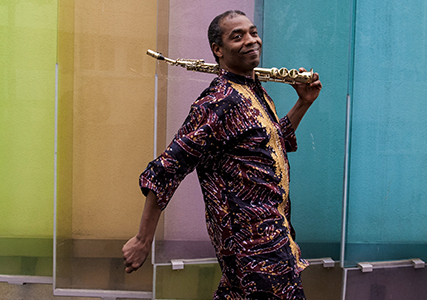
On the occasion of Femi Kuti’s recent, GRAMMY® Award-nominated album, Africa for Africa, The Los Angeles Times said he “makes something more than music. His [albums] and hugely popular concerts (‘one of the more powerful live shows on Earth,’ according to The Onion) are imbued with the weight fof family legacy and Kuti’s own individual intents. It is ‘music as message’ in a way few acts take on these days—protest and admonishment and hope all embedded in Afrobeat exuberance.” He’s followed up with the critically acclaimed new studio album, No Place for My Dream, released on June 25 by Knitting Factory Records.
The central aim of No Place for My Dream is getting back to the essence of Afrobeat, the music Fela pioneered by in the late ‘60s. Since beginning his career as a teenager in his father’s band, Femi has struck a delicate balance: carrying the torch, especially the activist dimension, of Afrobeat while developing his own sound. He has been equally committed to protecting, and going beyond, his father’s legacy. He played a key role in celebrating the recent opening of the Kalakuta Museum, which honors his father and his music in Lagos, and was instrumental in bringing the hit Broadway and touring show Fela! there.
Femi reflects, “Fela! has created so much international enlightenment on my father and me and the whole family. Now the government built a museum for my father and the town where he comes from is trying to build a museum.
Governors and politicians are trying to be friendly. They are finally seeing this is not a family they can mess with anymore.”
At 50, Femi is reaching for a new level of musical excellence, and desires, perhaps more than ever, to be the voice of a deprived population. He crafts his music with the utmost care, practicing sax for six hours a day, testing each melody, beat, and groove in the club-meets-laboratory of The Shrine (once firebombed by the authorities, and often shut down for dubious reasons by local officials.
Last updated: July 1, 2013